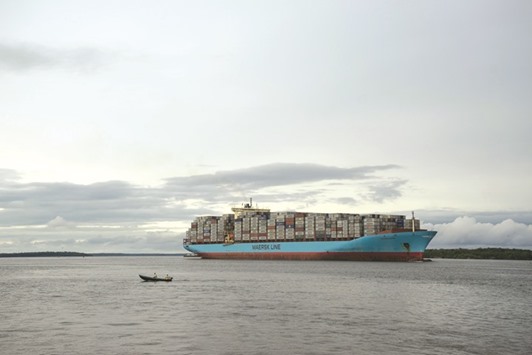Denmark’s AP Moller-Maersk has lost a major oil production contract in Qatar this week, just days after the shipping and oil group said it was considering a break-up due to worsening market conditions, shipping and banking sources say.
Maersk, which also announced last week the replacement of its chief executive and tasked the new CEO with a “strategic” review of its business, is battling on two fronts.
It is trying to deal with a container shipping market which is suffering its worst ever downturn and an oil business dealing with around a 60% fall in prices.
“Replacing a CEO via an intra-day announcement and announcing a strategic review – you are not doing it for nothing.
It is not because the numbers look that good,” said ABN AMRO analyst Thijs Berkelder. “We have to see what the company now really delivers for the remainder of this year in all of its activities: that’s not really clear to me,” said Berkelder, who maintained a “hold” rating for the group.
Maersk Oil said this week it had lost the contract to operate Al-Shaheen, Qatar’s largest oil field, which accounted for up to 40% of Maersk Oil’s output last year.
It had held the contract since 1992, which analysts at Clarksons Platou estimated could mean a fall in group net profits of $150mn to $200mn, based on the current oil price of around $50 a barrel.
The group reported a net profit of $224mn in the first quarter of this year, down from $1.6bn in the same period last year.
“They’re being hit in most parts of the business at the same time,” a senior oil banker at a European bank said.”The big worry is about their shipping business.”
Maersk Line, the group’s container shipping unit, is trying to remain the world’s biggest carrier as new challengers, particularly in Asia, try to grab a bigger share of a depressed market. Maersk veteran Soren Skou, 51, will replace Nils Smedegaard Andersen as group chief executive. Andersen, who will leave the group, had been in the job since 2007.
One senior shipping industry source said there were questions over whether Skou, who will also remain CEO of Maersk Line and who has been with the group for 33 years, would be able to tackle so many challenges at the same time.
“Skou is coming from inside the Maersk group and no one knows whether there is enough vision in terms of what is required. They really needs to be an overhaul,” the source said. “There are still question marks over the timing of the appointment and what lies ahead with so much turmoil.”
Maersk chairman Michael Pram Rasmussen said last week Skou was “a respected and knowledgeable leader with the ability to adapt quickly to market changes”.
The management change came days after the grandson of Maersk Mc-Kinney Moller, who transformed the shipping company into an international conglomerate, was appointed chief executive of the holding company behind the group.
Maersk’s chairman spoke last week about a possible split of the conglomerate into separate companies.
The company is the second biggest corporate contributor to Danish government revenues after Novo Nordisk. Maersk shares fell almost 9% on Monday to 8,110 crowns, partly on media rumours of the Qatari contract loss, partially recovering yesterday to close at 8,240.
Jakob Thomasen, head of Maersk Oil, told Reuters yesterday that the oil company would focus now on building on its business in the North Sea, in Kenya and other areas.
But analysts said that without the Qatar contract Maersk Oil would probably be too small to be listed as a stand-alone company and could therefore become a takeover target for larger oil companies.
“After this, Maersk Oil looks like a more obvious divestment candidate,” analyst Morten Imsgard from Sydbank said.
He said the price tag for Maersk Oil could be between 50bn and 90bn Danish crowns ($7.5bn-$13.4bn).
Total won a 30% stake in a new 25-year contract to operate the Qatari field on Monday.

A Maersk container ship sails toward the Buenaventura Port in Buenaventura, Colombia (file). Maersk Line, the group’s container shipping unit, is trying to remain the world’s biggest carrier as new challengers, particularly in Asia, try to grab a bigger share of a depressed market.
